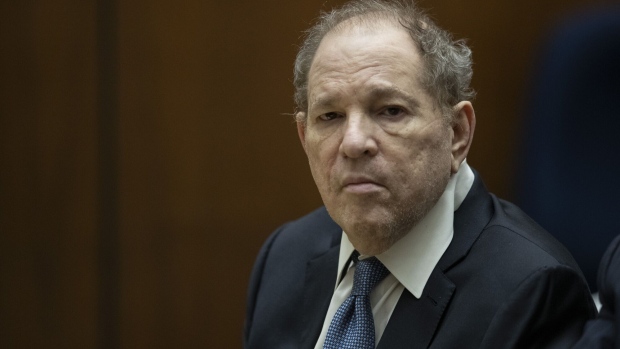Apr 25, 2024
Harvey Weinstein’s NY Conviction Is Overturned on Appeal
, Bloomberg News

(Bloomberg) -- Harvey Weinstein’s New York sexual assault conviction was overturned by the state’s highest court, which found that the judge in the disgraced Hollywood movie mogul’s 2020 trial had made fundamental errors.
In a 4-3 decision, the New York Court of Appeals on Thursday ordered a new trial, saying the judge had wrongly permitted women who weren’t part of the charges against Weinstein to testify as prosecution witnesses.
The rare reversal marks a stunning turnabout in the highest-profile conviction of the #MeToo era, and a blow to prosecutors’ use of testimony from witnesses who describe conduct that isn’t part of the underlying case. But in addition to facing a new trial in the case, for which he is currently serving a 23-year sentence in Rome, New York, Weinstein was sentenced to 16 years in California over similar charges.
Weinstein spokesman Juda Engelmayer said Weinstein’s lawyers wouldn’t seek his release on bail, given his conviction in California, but they expect him to be moved to a facility closer to New York City in the coming days. Weinstein, 72, is expected to be brought before a judge in Manhattan soon.
“There was so much pressure because Harvey Weinstein was the face of this movement,” his lawyer Arthur Aidala said at a press conference, referring to MeToo. “And he had to be convicted even if you had to throw the rule book out the window.” Aidala said the appeals court decision “instills in us the faith that there is a justice system.”
He said he was at home when his defense colleague Barry Kamins called him with the news of the decision, and that he also got a call from Weinstein himself, who thanked the defense team “more times than I can count.”
Aidala said the team was ready for a new trial, and predicted that in light of the ruling, “judges around the nation will scale back what they allow to be brought into evidence.”
‘Egregious Errors’
Judge Jenny Rivera, who wrote the majority opinion for the New York appeals court, found that the testimony of the women who weren’t part of the charges unfairly bolstered the allegations of the main accusers in the case, diminished Weinstein’s credibility and may have prevented him from testifying on his own behalf.
“The remedy for these egregious errors is a new trial,” she wrote.
Judge Madeline Singas wrote in a dissent that the majority opinion “ignores the nuances of how sexual violence is perpetrated and perceived, and demonstrates the majority’s utter lack of understanding of the dynamics of sexual assault.”
“New York’s women deserve better,” the judge wrote.
It’s now up to Manhattan District Attorney Alvin Bragg to decide how to proceed with the case.
“We will do everything in our power to retry this case, and remain steadfast in our commitment to survivors of sexual assault,” a spokesperson for Bragg said.
Weinstein’s conviction, for rape and sexual assault, was affirmed in 2022 by a midlevel state appeals court in a unanimous decision, but New York’s highest court later that year agreed to review the case. Aidala and Kamins argued that in the trial, New York State Supreme Court Justice James Burke had unfairly allowed the jury to hear testimony about alleged uncharged crimes, violating their client’s right to a fair trial.
They contended that the judge “repeatedly abandoned its duty to safeguard Weinstein’s constitutional guarantees and procedural rights,” leaving him “powerless to defend against an unchecked prosecutor.” That swamped the jury with prejudicial bad-character evidence to distract from the weaknesses in the complainants’ testimony, Weinstein’s lawyers said.
Prosecutors in California announced their indictment of Weinstein on rape and other charges on the first day of his New York trial. After he was convicted and sentenced in 2020, he was sent to Los Angeles to face prosecution there. Weinstein was convicted in Los Angeles in 2022 of another rape. He was acquitted on charges involving one of the women who testified in New York.
‘Dark Shadow’
The appeals court decision was met with consternation by advocates for victims of sexual assault.
“Their only goal was to give a voice to dozens of other women who suffered so much,” said Lindsay Goldbrum. Goldbrum has represented six Weinstein accusers, including Tarale Wulff, who testified in his New York trial. “Today’s ruling unfortunately casts a dark shadow on their bravery and will undoubtedly deter future sexual assault victims from coming forward,” Goldbrum said.
Evgeniya Chernyshova, who identified herself publicly after Weinstein’s California rape conviction, “is obviously disappointed” in the New York ruling, her lawyer David Ring said. Chernyshova, who was “Jane Doe 1” in the Los Angeles case, “feels badly for those victims who endured that trial and the subsequent appeals, only to see the convictions reversed,” he said. Ring said they are confident the California conviction will be upheld.
“Overturning the conviction of Harvey Weinstein is a horrible decision that does not protect due process — it upends justice for the survivors of his crimes,” said Scott Berkowitz, founder and president of the anti-sexual violence organization RAINN, who urged the Manhattan DA to “immediately commit to retrying him.”
And Julie Roginsky, co-founder of Lift Our Voices, a nonprofit advocacy group aimed at creating more equitable workplaces, called on New York to ban nondisclosure agreements “for toxic workplace issues.”
QuickTake: Why Companies Now Want Harassment Out in the Light
--With assistance from Olivia Konotey-Ahulu and Paige Smith.
(Updates with next steps in first section and reactions in last section. Previous versions of this story misspelled Weinstein’s name and gave the wrong number of witnesses in the second paragraph.)
©2024 Bloomberg L.P.